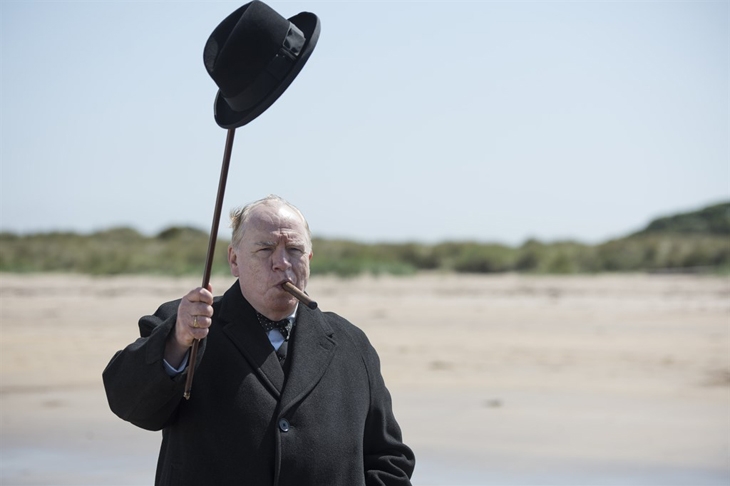The star of this film is the music, composed by Lorne Balfe. I really liked it, which was just as well, because it plays for about half the 98 minutes, while a superannuated Churchill, played by Brian Cox, moons about on beaches, deeply penitent for his catastrophic authorisation of the Gallipoli disaster in which a quarter of a million Allied troops lost their lives on the beaches of Turkey. It is the summer of 1944, and an apparently almost pacifist Churchill is timidly begging Eisenhower and Montgomery not to go ahead with the Normandy landings. He dreads the loss of life, you see.
Not being a Churchill scholar, indeed being, I must admit, Churchill-allergic, I have no idea if this is true or false. It did not ring any more true to me than the depiction of a benevolent and politically astute Mountbatten in Viceroy’s House, woodenly rendered by Hugh Bonneville. After all, this Churchill is the man who, as well as being responsible for Gallipoli in his younger days, would gleefully offer the British people blood, toil, sweat and whatever. He would round off his war career by bombing the civilians of Dresden and then casually handing over eastern Europe to Stalin, the worst mass murderer in modern times. By 1944, the death toll, for which he was directly responsible, must have been in the tens of millions; 1944 seems a bit late to be turning him into an agonised Hamlet. In one scene, Churchill, whose agnosticism is well documented, kneels down and prays.
This film concentrates on Churchill the self-doubter, Churchill the sufferer from black dog, and Churchill the foully bad-tempered bawler-out of secretaries. Here, no doubt, we’re on surer ground, for it is a matter of record that, especially when drunk, this is what he was like. The film-makers soften the truth, however, by making him melt when the latest pretty young secretary (Ella Purnell) tells him that her fiancé is a midshipman. Most improbably, Churchill manages to receive a personal message from the midshipman, who ‘sends his love’ to the secretary directly from the Normandy beaches. How this feat was achieved before the days of mobile telephones the audience is not informed.
Luckily, it was the cue for another sequence of scenes in which Churchill does not say anything at all, and perambulates beaches, gardens and enormous empty rooms while Lorne Balfe’s swirling tones waft around our ears.
Brian Cox does his best with an appalling script: there are some exchanges between Churchill and his wife Clemmie so leaden that you wonder how Cox and Miranda Richardson managed to say them with the conviction that they, nonetheless, heroically muster. When Clemmie goes behind his back to prevent him and the King sailing with the troops to Normandy he grumpily asks, ‘Is this about the war or is it about you and me?’ Can you imagine Churchill using ‘about’ in this sense? She replies, ‘Do you want to be coddled, Winston? Then don’t complain when someone tells you the truth.’ In another of these marital spats, she says, ‘Try acting like a hero, Winston, and then maybe we’ll think you are one again.’ He replies, ‘Why don’t you just have me stuffed?’ It could just as easily have been, ‘Why don’t you just get stuffed?’ for all the realism of the scene.
Miranda Richardson is a superb actress, of course, and there are moments when we are reminded less of Lady Churchill than of her glorious rendition of Pamela Flitton (Lady Widmerpool) in the televised Dance to the Music of Time. Fans of that show will recognise James Purefoy, who played Nick Jenkins in Dance, here making a brave stab at King George VI. He does the stammer and the voice well (by understatement) even though he does not, of course, remotely resemble that monarch.
I just pine for someone to make some good thrillers that aren’t too frightening and which have witty, snappy dialogue, ingenious plots and sexy heroines, rather than these endless ‘historical’ distortions. If you like this sort of ‘history’, though, you’ll probably go and see it, and agree with me that Churchill is well acted by all its principals, badly written and poorly directed.






Comments